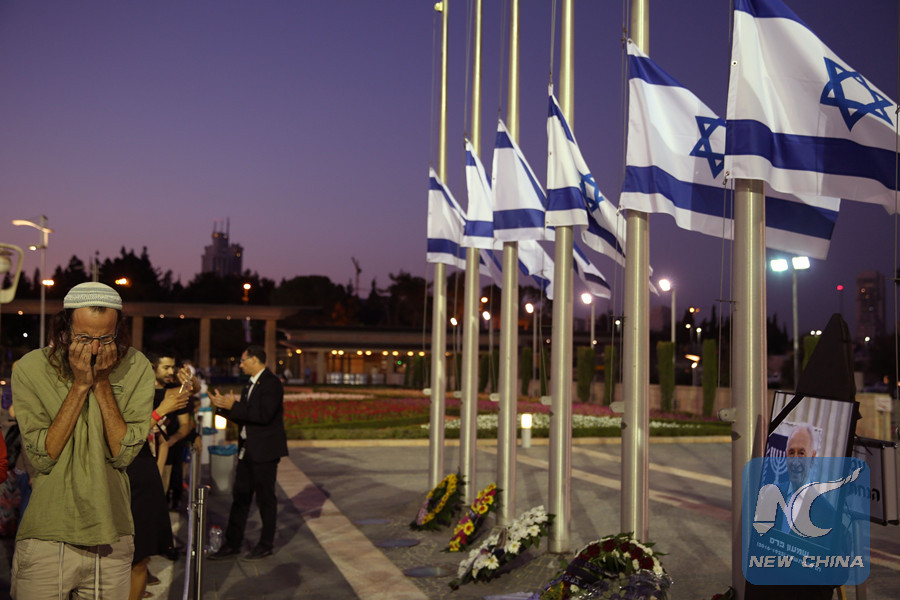The legacy of Shimon Peres
- By George N. Tzogopoulos
 0 Comment(s)
0 Comment(s) Print
Print E-mail China.org.cn, September 30, 2016
E-mail China.org.cn, September 30, 2016
|
|
| An Israeli Jewish man mourns in front of the coffin of former Israeli president Shimon Peres (portrait) at the plaza outside the Knesset, Israel's Parliament, on September 29, 2016 in Jerusalem. [Photo / Xinhua] |
Former Israeli Prime Minister and President Shimon Peres, who passed away at the age of 93, will be remembered as one of his country's greatest leaders.
As he devoted his life dealing with an issue as complicated and ambiguous as the Arab-Israeli conflict, his death has generated contradictory comments.
Most Israeli media portray him a "champion of peace," while several Arab commentators associate him with Palestinian suffering in the West Bank and Gaza and portray him a "settlement mastermind." Naturally, neutrality is absent amid increasing emotionalism in the long-standing conflict.
Endeavoring to assess the legacy of Shimon Peres from a external perspective, his role as a nuclear pioneer has first to be stressed. Peres founded his country's nuclear program critically enhancing its security.
Although an "open secret," Israel has managed to send a clear message to its neighbors in the Middle East to carefully consider the repercussions of an attack against it. Its will to hide the nuclear activity does not at all limit the significance of this achievement in its foreign and defense policy nowadays. The Peres name is synonymous with Israel's success.
More importantly, his contribution to the 1993 Oslo Accords deserves special attention. These accords confirmed the will of Israel and the Palestine Liberation Organization (PLO) to benefit by the new momentum of the post-Cold War era and explore opportunities for a sustainable peace process.
Subsequently, one year later, the architects of the agreement, namely then PLO leader Yasser Arafat, Israeli Premier Yitzhak Rabin and Shimon Peres were awarded the Nobel Peace Prize.
Much of what Israel and the Palestinian Authority agreed to in the Oslo Accords was consistent with the previous Camp David approach. They started with a transitional period of five years to try and negotiate and find mutually-accepted solutions to particularly difficult issues such as borders, sovereignty, arms control, refugees and Jerusalem.
However, the fact Israel recognized the PLO as the representative of the Palestinian people, and the PLO recognized Israel's right to exist, was an unprecedented breakthrough. Oslo also gave some hope to the Palestinians for the future establishment of their own state by transferring to PLO control a small piece of territory, the town of Jericho in Gaza.
The 1995 assassination of Rabin by an Israeli religious extremist opposed to the peace process showed how unpredictable factors could affect it. Peres, who succeeded Rabin as Premier, made important progress in bridging some of the differences with PLO with the exception of the status of Jerusalem – to be settled at a later stage. He also facilitated the resumption of talks with Syria, aided by then U.S. President Bill Clinton.
Nonetheless, Peres failed to inspire a feeling of security among ordinary Israeli citizens. In his attempt to reassure them of his ability to do so, he largely risked making some irresponsible decisions at the foreign policy level. In 1996 a massive Israeli attack against Lebanon ended with the killing of numerous innocent civilians in a UN camp. As a result, Peres lost the ensuing election to the Likud Party, led by Benjamin Netanyahu, who is also the current premier.
The political career of Peres did not finish in 1996. In 2001, he was appointed foreign minister and, in 2005, vice premier. Two years later, he became the ninth president of Israel, remaining an important political figure in the Middle East until his very last days generally more dovish than hawkish.
All in all, the vision of Shimon Peres to make the Middle East peace process a tangible reality did not yield positive results. The Oslo Accords collapsed, so he could not achieve what he wanted. Although he never stopped hoping as a great visionary, Israel and the Palestinian Authority have still – 23 years later – a long way to go in order to live in peace and for the latter to establish its own state.
Both sides are responsible for this state of affairs, and many scholars attribute the failure to the poor implementation of the negotiating terms. Nevertheless, following the death of Peres a discussion should be perhaps revitalized on whether the 1993 agreement did indeed constitute an opportunity to resolve the Arab-Israeli conflict.
Opposed to conventional wisdom, someone might argue that it caused internal cleavages in Israel, resulting in deterioration of its international position and also outlined the will of the Palestinian Authority – previously the PLO – and Hamas to subvert Israel.
George N. Tzogopoulos is a columnist with China.org.cn. For more information please visit:
http://www.china.org.cn/opinion/GeorgeNTzogopoulos.htm
Opinion articles reflect the views of their authors, not necessarily those of China.org.cn.







Go to Forum >>0 Comment(s)